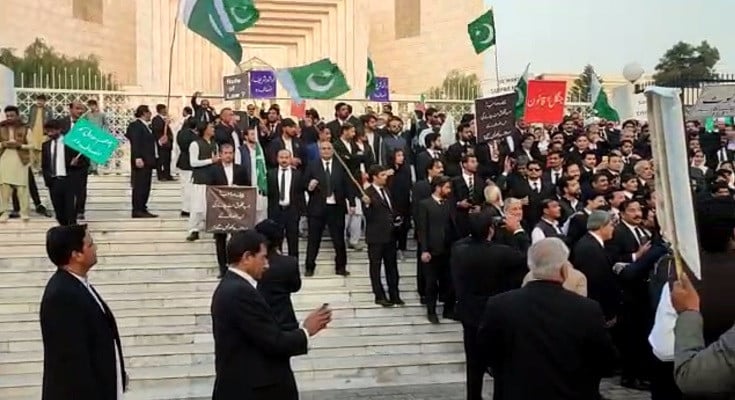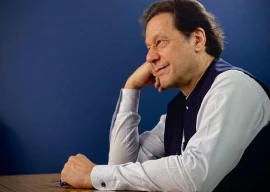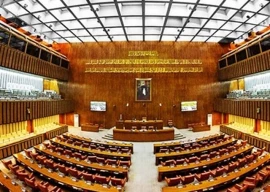
The participants of the first-of-its-kind round table moot of the legal fraternity have unanimously expressed their “full support” to the Constitution and Supreme Court and demanded free and fair elections in Punjab and Khyber-Pakhtunkhwa as per the Constitution and the apex court’s decision.
Renowned legal and constitutional experts, including Sardar Latif Khosa, Barrister Chaudhry Aitzan Ahsan and Khawaja Tariq Raheem, jointly hosted a round table conference titled “Sanctity of the Constitution and Judicial Independence in Pakistan” at a local hotel in Lahore on Saturday.
The conference was attended by more than 50 top lawyers and jurists of the country who vowed to uphold the sanctity of the Constitution.
The participants pointed out that general elections in Punjab and K-P were the core issue which Prime Minister Shehbaz Sharif wanted to “avoid”, noting that all other matters, like the composition of the benches and roster fixation, were merely distractions to detract from the central issue.
They demanded that the court should examine and summon those who wanted to delay or avoid the polls.
“If institutional respect is to be given to the legislature, those who have decided outside legislative processes to prevent action in accordance with the court’s directions, including, among others, the prime minister, the law minister and the interior minister be summoned to determine responsibility and held for violating the Constitution and contempt of this court by flouting its orders.”
The legal brains of the country underlined that any permissible legislation to regulate the top court or its processes ought not to be used, to destroy the court, its independence, its dignity and authority, noting that all these were internal matters of the apex court which needed be handled by the judges themselves.
Barrister Aitzaz read the declaration after the conference.
The declaration concluded starting, “As lawyers, we are the officers of the courts in Pakistan. As such, we are the primary stakeholders in the functioning of the courts according to the Constitution and the law as the independent bulwarks of the rights of the people of Pakistan, particularly the poor and the deprived. We thus need a strong court acting within the Constitution and according to the oath taken by the judges at all times. In so far as the courts continue to do so, we will always support them without reservation”.
The declaration read that “The constitutional controversies which have fractured the body politic and even caused schisms among the justices, mainly, on questions of bench formation; roster fixation; the role of judges as ‘politicians wearing robes’; or the court as an ‘imperialist’ court, all these need to be addressed by the judges themselves in due deliberations in the first instance, and not by any institution other than the judiciary itself and not in indecent haste”.
The declaration said that the role of the legislature and some political parties in the current situation had been “divisive, negative, bullish and opportunistic”.
It said the divide in the judiciary appeared to be more on account of personal linkages with parties and personal egos than on principle.
“The divide has created a situation of the nature that divided the Judges into personal relationships and egos in 1997 with disastrous effects. The present situation appears worse”, the declaration read.
Talking about the polarisation in superior judiciary, it said, “The polarisation of the judges is now to the extent that today upon the mere composition of the bench, a citizen is able to predict at the outset, the ultimate outcome of any case. That is why a controversy could be created whether seven or five judges sat on a bench that passed the Supreme Court’s Final Order dated 01 March 2023 which is yet to be obeyed and implemented. One faction believed it should have been seven judges; the other that it was indeed and in reality, only five judges, as only five judges heard the arguments of the parties and were competent to pass the Final Order by a majority of 3:2; a divided and weakened Supreme Court has been unable to bring to heed to such wanton acts of sheer contempt and disregard for the dignity of the Apex Court as to display huge billboards carrying portraits of sitting Superior Court judges and naming and shaming them in large public meetings”.
The caucus believed that elections to Punjab and the K-P assemblies remained the root cause of the present dispute and ugly imbroglio.
It demanded that elections must be held at the earliest as the period of 90 days had expired on April 14 in the case of Punjab and would expire on April 18 in the case of K-P.
The meeting noted that every Punjab and K-P voter wanted to cast their vote within the stipulated period of 90 days, emphasising that all the Pakistanis, irrespective of their rank and status, were bound to perform their duty towards that purpose.
It said that the cabinet’s recourse to legislation appeared to be mala fide, intended only to avoid an electoral contest and to devise a method to evade elections.
The participants of the meeting said that the government had come up with another novel pretext to avoid elections in Punjab and the K-P assemblies.
They observed that holding elections for all the assemblies on the same day was more convenient even if one of the five assemblies had dissolved three years before its term was over.



-(14)1720679028-0/(image-blakelively-on-Instagram)-(14)1720679028-0-165x106.webp)

1731028448-0/Untitled-design-(37)1731028448-0-165x106.webp)












COMMENTS (7)
Comments are moderated and generally will be posted if they are on-topic and not abusive.
For more information, please see our Comments FAQ